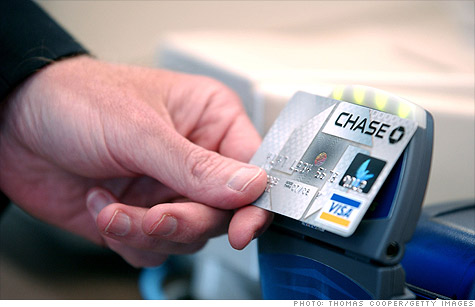Search News

NEW YORK (CNNMoney) -- Declined! Your debit card may soon be denied for purchases greater than $100 -- or even as little as $50.
JPMorgan Chase, one of the nation's largest banks, is considering capping debit card transactions at either $50 or $100, according to a source with knowledge of the proposal. And the cap would apply even if you run your debit card as credit.
Why? Because of a tricky thing called interchange fees.
Right now, every time you swipe your debit card your bank charges the retailer an average fee of 44 cents, which it shares with its partners. Those little fees, however, add up to about $16 billion per year, according to 2009 data from the Federal Reserve.
But as part of the Wall Street reform legislation that was passed last year, these fees are being slashed. The Fed is currently proposing rules that would go into effect in July and would cap interchange fees at 12 cents.
That's a big enough cut to cost Chase (JPM, Fortune 500) more than $1 billion a year. And Chase may not be alone. Other major issuers are also projecting huge losses from the interchange fee cap.
Joe Price, president of consumer banking for Bank of America (BAC, Fortune 500), said in an e-mailed statement that the lower fee wouldn't fairly compensate the bank for the infrastructure and services it provides to retailers.
And consumers would end up feeling the pain when Bank of America is forced to recoup costs "by increasing the cost of their everyday debit card transactions, limiting their payment choices, and impacting industry innovation," according to the email.
Aside from mulling over a limit on transaction amounts, Chase is already testing $3 monthly fees on debit cards and $15 fees on checking accounts in certain states. Additionally, the bank announced in November that it has stopped issuing debit rewards cards.
A Chase spokesman declined comment on this story.
The revenue banks get from interchange fees helps to offset money lost from fraudulent transactions. So with the Fed's proposed cap in place, banks argue they won't have the money to protect themselves against fraud. And, of course, the bigger the purchase the bigger the risk, so banks are considering limiting consumers' ability to pay by debit card.
"If banks cannot recapture their fraud-prevention costs, it is likely that a lower percentage of transactions at the point of sale would be approved," Price said. "If the final rules that are issued in April look like the draft, there's no question that it will impact how we and other issuers price deposit and payment services and what features and benefits are included."
But a Bank of America spokesman declined to comment on whether the bank would cap debit card purchases at $50 or $100.
Representatives from Wells Fargo (WFC, Fortune 500) and HSBC (HBC) declined to comment on their plans, while a spokeswoman from Citi (C, Fortune 500) said the bank isn't making any changes at this time.
If a cap like this does make its way into accounts across the board, consumers would be forced to write checks, withdraw cash from ATMs, or put their spending on credit cards.
"The whole model on the debit card side is in flux because of Dodd-Frank," said Brian Riley, senior research director at financial services consulting firm TowerGroup. "The unfortunate thing is that the people who will really get hurt on this are the people who need the most help."
Many consumers with bad credit aren't able to qualify for credit cards -- and when they do, it's often with hefty rates and fees. Additionally, ATMs typically only dole out a limited amount of money at a time and checking accounts are being loaded with fees.
At the same time, even the customers who do qualify for credit cards are being punished for having tarnished credit. Bank of America, for example, announced a $59 annual fee last month for its riskiest customers -- making up about 5% of consumer credit card accounts. ![]()



| Overnight Avg Rate | Latest | Change | Last Week |
|---|---|---|---|
| 30 yr fixed | 3.80% | 3.88% | |
| 15 yr fixed | 3.20% | 3.23% | |
| 5/1 ARM | 3.84% | 3.88% | |
| 30 yr refi | 3.82% | 3.93% | |
| 15 yr refi | 3.20% | 3.23% |
Today's featured rates:



| Index | Last | Change | % Change |
|---|---|---|---|
| Dow | 32,627.97 | -234.33 | -0.71% |
| Nasdaq | 13,215.24 | 99.07 | 0.76% |
| S&P 500 | 3,913.10 | -2.36 | -0.06% |
| Treasuries | 1.73 | 0.00 | 0.12% |
| Company | Price | Change | % Change |
|---|---|---|---|
| Ford Motor Co | 8.29 | 0.05 | 0.61% |
| Advanced Micro Devic... | 54.59 | 0.70 | 1.30% |
| Cisco Systems Inc | 47.49 | -2.44 | -4.89% |
| General Electric Co | 13.00 | -0.16 | -1.22% |
| Kraft Heinz Co | 27.84 | -2.20 | -7.32% |
|
Bankrupt toy retailer tells bankruptcy court it is looking at possibly reviving the Toys 'R' Us and Babies 'R' Us brands. More |
Land O'Lakes CEO Beth Ford charts her career path, from her first job to becoming the first openly gay CEO at a Fortune 500 company in an interview with CNN's Boss Files. More |
Honda and General Motors are creating a new generation of fully autonomous vehicles. More |
In 1998, Ntsiki Biyela won a scholarship to study wine making. Now she's about to launch her own brand. More |
Whether you hedge inflation or look for a return that outpaces inflation, here's how to prepare. More |